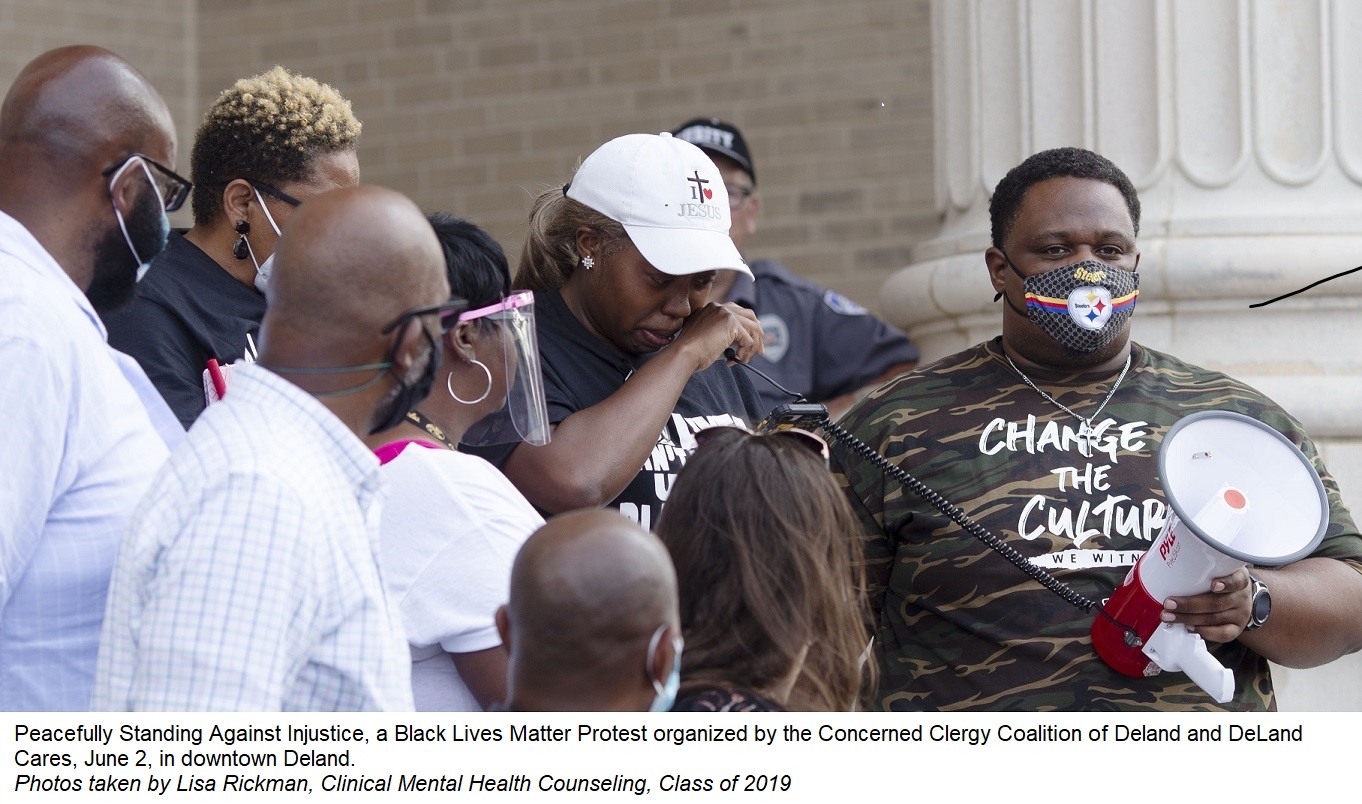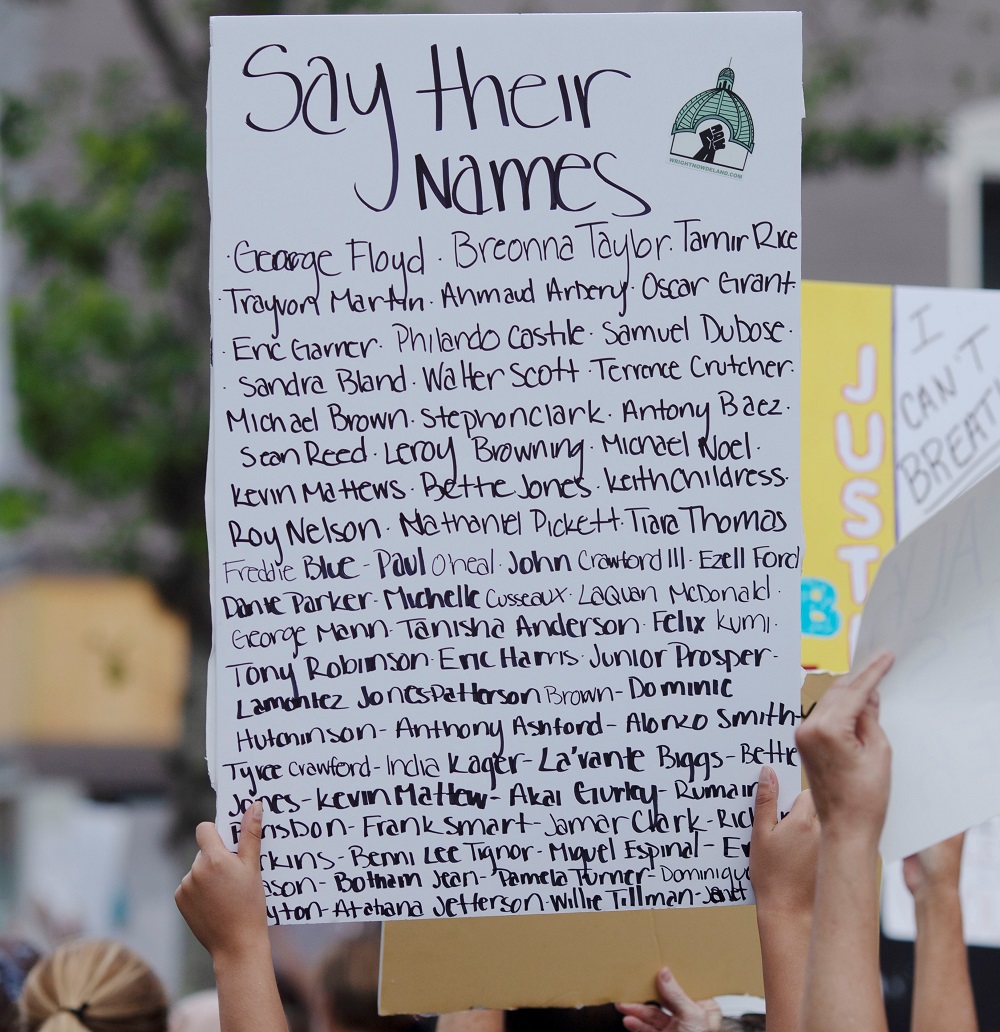
Addressing Systemic Racism In Our Department
It's Time for Action
Our Counselor Education Department is committed to continual growth and development just as we ask each of you to be while on your journey to becoming a counselor.
The most recent atrocities and injustices perpetrated against the Black community have helped many allies of the Black community recognize elements of systemic racism that were previously concealed by privilege. Our faculty are taking an active stance and are committed to addressing systemic racism that we recognize is present in our department.
I hope you will take the time to listen to the following video message that was recorded in Summer 2020 regarding our response and the initial development of our plan. We truly care about and appreciate every student in our program, and an important goal we have is to ensure that our classes and our offices are places where each student feels valued and genuinely seen. Another valuable goal of ours is to educate and graduate professional counselors who are exceptionally knowledgeable, ethical, culturally competent, and reflective practitioners.
Our Plan for Change
Our departmental plan has three components – education, support, and advocacy. We will have a consistently evolving plan in which one phase is informed by and builds upon the others. Please continue to check back as our webpage will continue to evolve as well.
Education
This portion will focus on all stakeholders within our department gaining a shared understanding of:
- the definition of systemic racism, its individual components, and its far-reaching and devastating impacts
- the ways in which systemic racism is present in our curriculum, our classes, and our interactions with one another
What we have done and are currently doing:
- In the summer 2020 semester, all faculty engaged in an honest discussion about ways in which systemic racism is present within our department. Some examples highlighted in these discussions included (Note: the below examples do not apply to all faculty members or courses):
- A lack of course materials utilized that are written by Black and Brown authors, theorists, and experts within the counseling field
- Communicating course content from an all-White perspective and mistakenly applying this perspective to clients of all cultural groups during lecture
- A lack of focus on topics related to racial trauma
- Course assignments that may be experienced as culturally insensitive
- Efforts to help White students recognize White privilege can unintentionally expose students from historically marginalized communities to undue stress and embarrassment.
- During the Summer 2020 semester, many students and faculty attended or viewed the following Stetson discussion panels to enhance the shared understanding of racism experienced in our community:
- On June 23, 2020, Let's Talk Racism (Part One) provided space for current Stetson students and alumni to engage in storytelling and share their experiences of racism.

- In the Fall 2020 and Spring 2021 semesters, the faculty searched for and selected an external consultant we intend to hire to evaluate our department's equity practices and diversity inclusion and provide extensive feedback.
- Multiple faculty members intentionally added new material to their Fall, Spring, and Summer courses centered on diversity and the inclusion of resources specifically focused on Black mental health.
- We are sharing numerous opportunities for workshops and conferences within the profession that highlight racial trauma and culturally competent mental health practices on our department's social media and weekly announcements.
- In the Spring 2021 semester, there was a distinct shift in curriculum and assignments, reducing the requirement for students to self-disclose while maintaining an emphasis on self-reflection.
- All faculty participated in two "pair and share" activities during the Spring 2021 semester during which they reviewed their syllabi with a colleague and received feedback on enhancing equity and including resources by diverse authors and counseling professionals.
- During the Spring 2021 and upcoming Fall 2021 semesters, faculty allies of the Black community are reading Why Aren’t We There Yet? Taking Personal Responsibility for Creating an Inclusive Campus by Jan Arminio, Vasti Torres and Raechele Pope together and engaging in discussions to identify specific departmental changes that will enhance our inclusivity. All faculty review proposed changes prior to implementation.
What is still on the horizon:
- We are exploring effective methods and curriculum for teaching students about implicit bias and microaggressions prior to the Multicultural Counseling course.
- Continued examination of curriculum, assignments, experiential activities, lectures and course materials to ensure equity and diversity inclusion
Support
This aspect may look somewhat different for Black students, White students, and students of color who don’t identify as either of these while we move through the process of self-examination and change work. Understandably, all students may find that they desire differing forms of support at different times. For example, sometimes support will be most helpfully presented as a space where you can talk to and share your experiences with those similar to you. At other times, support can be best experienced when students of different cultural backgrounds come together to accomplish a shared goal unitedly. Regardless of the group with whom you identify, talking meaningfully about racism will be uncomfortable, and genuine change is by no means simple. Therefore, the importance of support throughout our process cannot be overstated.
What we have done and are currently doing:
- In the Summer 2020 semester, Chi Sigma Iota, in collaboration with the department chair, sent out a needs assessment survey to determine the types of support desired by students. Results included:
- Greater attention at the departmental level paid to racial injustices in our society
- A group where students can discuss ways to end racial injustice and systemic racism in our country
- Assistance with stress management
- Avenues for organization and participation in protests and other forms of campus and community advocacy
- Specific education about how to advocate at the local government level for long term change
- In the Summer and Fall 2020 semesters, Chi Sigma Iota hosted a bi-weekly virtual student-only support group on the first and third Friday evenings of the month. Chi Sigma Iota named their meeting the You Can't Fix It Group with a purpose of sharing and community building in a confidential space.
- In Fall 2020, the department applied for an HRSA government grant that is focused on increasing the number of professional counselors from underrepresented groups and educating counseling students about culturally competent effective services for medically underserved populations. If funded, this grant will pay students participating in the grant program $10,000 each for living expenses while in practicum and internship.
- In Spring 2021, a faculty member began developing a new multicultural graduate counseling student organization called IMPACT (Intellectuals Methodically Pursuing Academic Consciousness Together), which is expected to be ready for membership in Fall 2021.
- We are providing increased student communication regarding campus and community advocacy events addressing systemic racism (this point relates to both Support and Advocacy).
- We began incorporating the Office of Diversity and Inclusion into our prospective student interview day and annual student meeting so that all students know where they can go for support and to submit bias reports if needed.
What is still on the horizon:
- We are exploring the potential for offering a multicultural counseling student support group through the Cross-Cultural Center.
Advocacy
This portion of our plan will be where the true change lies. Advocacy is a veritable pillar of the counseling profession, and, like support, advocacy may embody multiple forms throughout our process of addressing systemic racism. In the beginning, advocacy will take place primarily within our department. However, we will also create and recognize opportunities to expand our advocacy within our University, throughout our communities, and on to a larger national scale.
What we have done and are currently doing:
- Many students and faculty within the department participated in peaceful Black Lives Matter protests (wearing appropriate face coverings) during the Summer 2020 semester.
- During the Fall 2020 semester, select faculty worked with an interdepartmental group to write the College of Arts and Sciences Statement of Commitment to Racial Justice and Equity.
- We are providing increased student communication regarding campus and community advocacy events addressing systemic racism (this point relates to both Support and Advocacy).
- Let us know what advocacy-related activities you have been doing so we can add them here!
What is still on the horizon:
- Collaborations with the Florida Counseling Association are in the works!
Additional Resources
Systemic Racism Action Resources
Stay In Touch
We hope you will reach out to us with any questions or comments. Look for our emails and social media posts for resources and opportunities pertaining to support, education and advocacy regarding important topics such as racial trauma and systemic racism. We wish everyone a healthy and safe semester!
Stetson University, Counselor Education, updated April 23, 2021
June 2nd Peacefully Standing Against Injustice Protest in Deland
Photos taken by Lisa Rickman, Clinical Mental Health Counseling, Class of 2019
